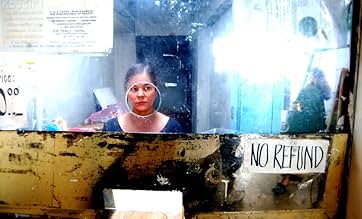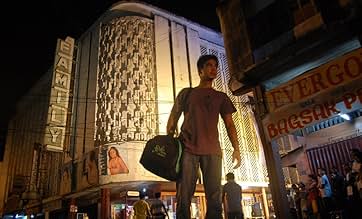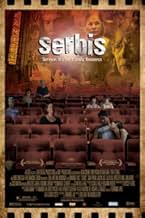The Pineda family struggles with bigamy, unwanted pregnancy, possible incest, and skin irritations in a dilapidated movie theater.The Pineda family struggles with bigamy, unwanted pregnancy, possible incest, and skin irritations in a dilapidated movie theater.The Pineda family struggles with bigamy, unwanted pregnancy, possible incest, and skin irritations in a dilapidated movie theater.
- Awards
- 9 wins & 15 nominations total
Kristoffer King
- Ronald
- (as Kristofer King)
Dido de la Paz
- Atty. Quintana
- (as Dido Dela Paz)
Buddy Caramat
- Tonette
- (as Buddy Salvador Caramat)
Aaron Rivera
- Ricky
- (as Aaron Christian Rivera)
Featured reviews
This is just the type of theater that one would expect to see certain politicians in the corner hiding from the press and their constituents. It is a seedy gay theater that shows heterosexual soft core porn films.
We go up and down the stairs of this theater as the family that runs it plays out their lives. Director Brillante Mendoza won a few awards, including a Golden Palm nomination.
Jacklyn Jose was very good as the daughter who keeps things going. She also has a very cute kid (Bobby Jerome Go). Gina Pareño won an Asian Film Award for her role as the matriarch who is trying to get rid of her philandering husband. Meanwhile, Alan's (Coco Martin) girlfriend (Mercedes Cabral) is pregnant, inspiring more drama and yelling. All of this occurs as they struggle to keep the last of three movie houses from going bankrupt.
The ending is pretty anticlimactic and I really didn't see it coming.
We go up and down the stairs of this theater as the family that runs it plays out their lives. Director Brillante Mendoza won a few awards, including a Golden Palm nomination.
Jacklyn Jose was very good as the daughter who keeps things going. She also has a very cute kid (Bobby Jerome Go). Gina Pareño won an Asian Film Award for her role as the matriarch who is trying to get rid of her philandering husband. Meanwhile, Alan's (Coco Martin) girlfriend (Mercedes Cabral) is pregnant, inspiring more drama and yelling. All of this occurs as they struggle to keep the last of three movie houses from going bankrupt.
The ending is pretty anticlimactic and I really didn't see it coming.
This film challenges the actors to portray their characters realistically. The story revolves around them and there is no clear climax. Rather, it is a cacophony of events plotting the life of this family living in a run-down theater. They are barely subsistent.
I have a sense of having watched a play because the entire scene takes place in the theater. Camera techniques and lighting has been well placed that it draws the emotion and atmosphere accurately. The use of hand held technique and the background noise gives emphasis to the chaos and discordant lives that is.
Being a low-budget independent film, demonstrates to us that a good movie can be achieved and interpreted such as "SERBIS".
I have a sense of having watched a play because the entire scene takes place in the theater. Camera techniques and lighting has been well placed that it draws the emotion and atmosphere accurately. The use of hand held technique and the background noise gives emphasis to the chaos and discordant lives that is.
Being a low-budget independent film, demonstrates to us that a good movie can be achieved and interpreted such as "SERBIS".
I watched this movie with my filipino wife, she knew a many actors from there. I like the older pinoy movies, however they are mostly depressive and about hard life, but probably since this is not so old movie, it was not so dark. With a little filipinou humour style, i liked it.
A dilapidated Filipino movie theater is the star of this film, but it's not a dark, haunted place like the cinema of Tsai Ming-liang's austere Goodbye, Dragon Inn. Located in the city of Angeles in the Philippines, this one, only partly ironically called "Family," is active, in fact overactive, and holes in walls leave it open to invasions from goats and its lower floor is exposed to the noises of a busy street crammed with pedestrians, motorcycles, cars, and trucks at all hours.
Serbis shows heterosexual porn movies all day long while numerous gay hustlers ply their trade for the pleasure of older gay men, performing fellatio or having it performed on them in the seats and in the back of the big auditorium. "Serbis" means "service" and is the rallying cry of the gay rent boys. The theater is run by the Pineda family, who come and go, they live upstairs, they run a fast food restaurant on the ground floor, and they deal with such personal problems as bigamy, unwanted pregnancy, possible incest, and a boil on an attractive young male bum. This film, which includes clips of the porno, live sex involving the family and the in-house prostitutes, is Mendoza's seventh feature film and was an official selection of the 2008 Festival de Cannes.
Events happen on a "Wednesday (the day for the novena to the Mother of Perpetual Help) in October (month-long feast of Our Lady of the Rosary)"--I'm quoting from the distributor's material. The rather regal Nanay Flor (Gina Pareno) has filed a bigamy case against her estranged husband Tatay Edwinand goes to court to see the years-long case finally decided. Alan (Coco Martin) is a young man upstairs who paints busty nudes on the wall; he's the one who has a boil on his bum. He has sex with his girlfriend Merly (Mercedes Cabral) and has just learned to his dismay that she is pregnant. Nayda (Jacky Jose), who mans the theater while Nanay For is at court, is married but drawn to her cousin Ronald, who is also in the building. She sees to having the right movie posters up, and argues with her husband, Lando, on the phone, because Mr. El Lobo, the soft drink distributor, has to be paid. Lando (Julio Diaz) mans the little restaurant, not always successfully; a young man cheats him out of 30 pesos and he can't get it back. There is another brother, Ronald (Kristopher King). There's also a little bespectacled schoolboy, Jonas, who's good in math. The things he sees! Nanay Flor says that they had three theaters, but have had to close the other two because they weren't making money, and this one is failing.
Nanay Flor loses the case, and to her disappointment her youngest son, Jerome (Dan Alvaro) testifies against her. She is further distressed to learn that the film rentals are going up. Serbis is replete with actual details of this kind, and even shows Alan delivering reels to a bus and picking up the new ones for the week.
Excitement happens when a purse-snatcher tries to take refuge in the theater but customers, the family, and cops all chase him. The lights go on exposing the many "serbis" boys 'in flagrante.' When the thief is caught the lights go down, the film resumes, and the "serbis" boys are back to work. At another point a small white goat has escaped into the theater and appears just below the screen. Another chase. To recover from her horrible day, Nanay Flor takes a bath in the shoddy bathroom (the Gent's is flooded), grooms herself and dresses in black, and goes down to the ticket window facing out, ready for anything.
After symbolically popping his boil, Alan has impulsively packed a bag and run away. way.
Carlo Tabije and Benjamin Padero deserve notice for their set designs (the field in which Mendoza got his start); Odyssey Flores' cinematography is rough at times, but effective. The processing gives the images too edgy a look at times. The lighting isn't bad, but there is way too much street noise, and those who argue the whole production is exploitive and crude aren't far off the mark, but the depiction of a family isn't without interest, though this has none of the poetry and mood of other films about the devolution of a place.
This is as if a Third World 'telenovela,' with X-rated sex added, was all crammed into a single comprehensive 90-minute episode. It's an impressive achievement, but a little bit indigestible. Mendoza's earlier film 'Foster Child' received an ovation at the previous Cannes festival. He has produced something sui generis this time and it would appear that there is life in the Filipino film industry.
Serbis shows heterosexual porn movies all day long while numerous gay hustlers ply their trade for the pleasure of older gay men, performing fellatio or having it performed on them in the seats and in the back of the big auditorium. "Serbis" means "service" and is the rallying cry of the gay rent boys. The theater is run by the Pineda family, who come and go, they live upstairs, they run a fast food restaurant on the ground floor, and they deal with such personal problems as bigamy, unwanted pregnancy, possible incest, and a boil on an attractive young male bum. This film, which includes clips of the porno, live sex involving the family and the in-house prostitutes, is Mendoza's seventh feature film and was an official selection of the 2008 Festival de Cannes.
Events happen on a "Wednesday (the day for the novena to the Mother of Perpetual Help) in October (month-long feast of Our Lady of the Rosary)"--I'm quoting from the distributor's material. The rather regal Nanay Flor (Gina Pareno) has filed a bigamy case against her estranged husband Tatay Edwinand goes to court to see the years-long case finally decided. Alan (Coco Martin) is a young man upstairs who paints busty nudes on the wall; he's the one who has a boil on his bum. He has sex with his girlfriend Merly (Mercedes Cabral) and has just learned to his dismay that she is pregnant. Nayda (Jacky Jose), who mans the theater while Nanay For is at court, is married but drawn to her cousin Ronald, who is also in the building. She sees to having the right movie posters up, and argues with her husband, Lando, on the phone, because Mr. El Lobo, the soft drink distributor, has to be paid. Lando (Julio Diaz) mans the little restaurant, not always successfully; a young man cheats him out of 30 pesos and he can't get it back. There is another brother, Ronald (Kristopher King). There's also a little bespectacled schoolboy, Jonas, who's good in math. The things he sees! Nanay Flor says that they had three theaters, but have had to close the other two because they weren't making money, and this one is failing.
Nanay Flor loses the case, and to her disappointment her youngest son, Jerome (Dan Alvaro) testifies against her. She is further distressed to learn that the film rentals are going up. Serbis is replete with actual details of this kind, and even shows Alan delivering reels to a bus and picking up the new ones for the week.
Excitement happens when a purse-snatcher tries to take refuge in the theater but customers, the family, and cops all chase him. The lights go on exposing the many "serbis" boys 'in flagrante.' When the thief is caught the lights go down, the film resumes, and the "serbis" boys are back to work. At another point a small white goat has escaped into the theater and appears just below the screen. Another chase. To recover from her horrible day, Nanay Flor takes a bath in the shoddy bathroom (the Gent's is flooded), grooms herself and dresses in black, and goes down to the ticket window facing out, ready for anything.
After symbolically popping his boil, Alan has impulsively packed a bag and run away. way.
Carlo Tabije and Benjamin Padero deserve notice for their set designs (the field in which Mendoza got his start); Odyssey Flores' cinematography is rough at times, but effective. The processing gives the images too edgy a look at times. The lighting isn't bad, but there is way too much street noise, and those who argue the whole production is exploitive and crude aren't far off the mark, but the depiction of a family isn't without interest, though this has none of the poetry and mood of other films about the devolution of a place.
This is as if a Third World 'telenovela,' with X-rated sex added, was all crammed into a single comprehensive 90-minute episode. It's an impressive achievement, but a little bit indigestible. Mendoza's earlier film 'Foster Child' received an ovation at the previous Cannes festival. He has produced something sui generis this time and it would appear that there is life in the Filipino film industry.
I got very curious of Brillante Mendoza's work after his victory at Cannes for the film "Kinatay". I saw one of his films years before, "Masahista" (The Masseur) and I wasn't really a big fan. I just didn't care much for the style or the storytelling ability. The film was just doesn't show the promise or the makings of a great director. I've heard so much about "Serbis" and "Kinatay". Most of it strong reactions of how raw it is and the director himself was blatant to say that he intends to do the kind of films that you'll either hate or love. I choose to reserve judgment until I get to see both films. After seeing "Serbis", I have to say that Brillante Mendoza improved a lot from the time he made "Masahista". While the film is not outstandingly brilliant or groundbreaking, I definitely saw a lot of promise there. I get the lack of plot. It was intentional, it was meant to be a slice of life, a day in the life of a family in moral decadence. What I don't get is the lack of perspective and "voice". While the director seemingly takes the observation post and chooses to reserve judgment, the fact that you choose what to show in front of the audience is an obvious statement that you're condemning that "immorality" has become a normalcy in the lives of the Filipino people. I know another layer to it that everything is just a parallelism to the Philippine movie industry. I'm not criticizing the judgment but at least if you're going to say something, commit to it rather than putting it as an undertone. Take for example, the kid who took the extra change and lied about it. If the director just really wants to stay on the observation post and reserve judgment, then the camera has no business following the kid. By choosing to show it, you have obviously taken a stand. Not that I'm looking for a rationalization or a justification the cause for the degradation of morality of the whole family but if you're showing it as something wrong, I certainly wouldn't mind a progression on how the lack of morality would drive these people. Putting it on a plain field just makes the whole thing monotonous. I haven't had the chance to see "Kinatay" but from the reviews that I have read, it had the same problem. Brillante Mendoza has the eye and the promise to make it as a great director but if he keeps on serving the same thing and committing the same mistakes, then I wouldn't be surprised he'll soon be buried in the pile.
Did you know
- TriviaDirector Brillante Mendoza revealed that the sex scene between Coco Martin and Mercedes Cabral was simulated. "It was assumed by everyone that in the sex scene there was real penetration. The actors knew how I work, and if they were on a different level of their profession, they probably would have had real sex. But since this was the girl's first film and she's from a conservative family, she had done enough, so there is no penetration. But I wanted people to believe there was actual sexual intercourse, and it was so realistic that people believe that's what happened," he explained.
- Quotes
Nanay Flor: How could you let this idiot impregnate you?
- ConnectionsFeatured in Logos from Around the World: Philippines (2016)
- How long is Service?Powered by Alexa
Details
- Release date
- Countries of origin
- Official site
- Languages
- Also known as
- Servis
- Filming locations
- Production companies
- See more company credits at IMDbPro
Box office
- Gross US & Canada
- $64,536
- Opening weekend US & Canada
- $12,824
- Feb 1, 2009
- Gross worldwide
- $155,156
Contribute to this page
Suggest an edit or add missing content































